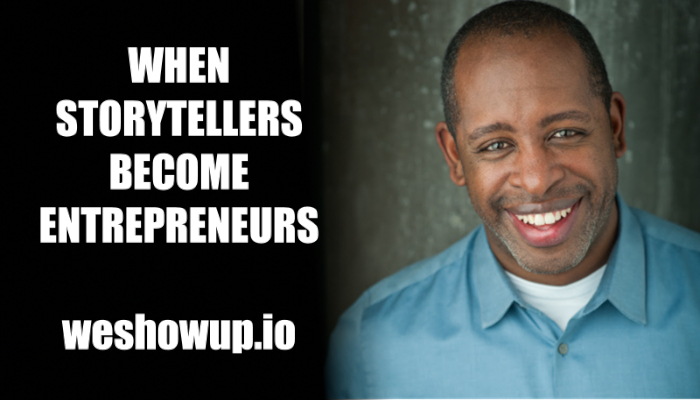
The great game of business is a story filled with roles, events, and influences. So, what happens when the entrepreneur in this great game is also a storyteller?
I first met Kahlil Ashanti in 2015 after watching his one man show, Basic Training. While I consider myself a pretty good storyteller, I’m self-aware of my limitations. Let’s just say that I could never pull-off what Kahlil does onstage.
We’ve interacted periodically via social media since then, but when a LinkedIn notification mentioned that he’d started a new company catering to storytellers, I had to reach out.
His company, weshowup, is a pay-what-you-want service. The website calls it: “A digital risk-reversal model for selling arts, culture, and entertainment.” Weshowup isn’t the first company to implement a risk-reversal model. Software has experimented with freemium and shareware models for years: Radiohead offered its In Rainbows album as pay-what-you-want in 2007; and companies like Kickstarter have offered ways to prepay for future products.
But, weshowup adds two new wrinkles to the pay-what-you-want model: it’s designed to price a service as opposed to a product and that value is assessed after delivery. This flies in the face of traditional services-pricing strategies. Known rather crudely as “the call girl effect,” traditional service pricing models are built on the premise: the value of a service diminishes after services are rendered.
“It’s about trust,” Ashanti said. Weshowup is based on acknowledging “…that the power is in the audience’s hands as opposed to the other way around.” He explained how in an age of digital distraction, artists and venues must recognize the authority of audiences with so much information at their fingertips. “We’ve all experienced paying for a performance, yet felt cheated with the traditional ticketing model.”
I understood what he was saying. The traditional model requires audience members to risk real dollars–frequently months before the performance with no tangible reason for why the price represents the value delivered. But, while I appreciated weshowup’s risk-reversal model as an audience member, the performer inside of me worried. What if the audience decides not to pay after my performance?
“Freeloaders don’t make the effort to come out,” he said, “and there will always be someone who tries to cheat every system. People who care show up. They feel loyalty to the performer, artist or speaker, who is taking a risk that audiences want to embrace.” He also pointed rather harshly to the other side. “This model is not for performers who want shortcuts. The audience will decide on whether the performer worked for it or phoned it in.”
Weshowup’s pricing model is about the relationship between artists and their audiences. “It’s not about feeling sorry for the artist; it’s about care and giving afterwards. It’s about loyalty.” And that loyalty goes much further than supporting a busker who passes a hat or displays an open guitar case.
Initial tests have yielded promising results. For example, in the first test, Kahlil requested an up-front, $5 reservation fee, leaving the final price to be determined after his performance. By the end of the night, the show averaged $53 per booking. The word spread quickly, and venues around the world, like Charlotte NC, NYC, Australia and the UK, supported the idea with both investments and trial opportunities.
Weshowup is rolling out its technology to venues first, with artists working through those venues. The venues pay customized annual license fees based on seating capacity.
Kahlil Ashanti is demonstrating the power of being both an entrepreneur and a storyteller. The storyteller in him demands empathy for his audiences. The entrepreneur in him offers the ability to see future potentials, such as opening access to those without the disposable income required by traditional ticket pricing.
“Anyone can show up and nobody knows how much you paid. Come as you are. Some can give more, some give less, and the person sitting next to you will never know. Either way, all are welcome and in this world of weaponized differences and divisiveness, a little inclusion can’t hurt.”
To learn more, check visit weshowup.